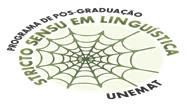Banca de DEFESA: SIMONE MILLER DA SILVA CAMPOS
Uma banca de DEFESA de DOUTORADO foi cadastrada pelo programa.DISCENTE : SIMONE MILLER DA SILVA CAMPOS
DATA : 09/09/2021
HORA: 14:00
LOCAL: Webconferência
TÍTULO:
DISCOURSE OF THE SUBJECTS-TEACHERS AND SUBJECTS-STUDENTS ABOUT THE PROCESS OF TEACHING-LEARNING OF PORTUGUESE LANGUAGE AND ENGLISH LANGUAGE IN BASIC EDUCATION
PALAVRAS-CHAVES:
Discourse Analysis. Teaching Practice. Portuguese Language. English Language. Official documents.
PÁGINAS: 169
GRANDE ÁREA: Lingüística, Letras e Artes
ÁREA: Lingüística
SUBÁREA: Teoria e Análise Lingüística
RESUMO:
This research, inscribed in the research line Studies of Discursive Processes, of the Post-Graduate Program in Linguistics at UNEMAT, aims to analyze – from the theory of Discourse Analysis of the French line, founded by Pêcheux, in France and, later, developed by Eni Orlandi and other linguists in Brazil – the discourse of the subjects teachers and students about the teaching-learning process of Portuguese Language and English Language and the curricular documents PCN, PCN+, OCN and BNCC, all from High School. With this, we verify if the saying of the law materializes in the practice of teaching of these languages. The locus of the research was the State School Deputado Bertoldo Freire, located in São José dos Quatro Marcos, in Mato Grosso State. Then, we present how the High School Reform took place and, consequently, full-time education, analyzing the discourse on/of full-time education in/for Mato Grosso State. We also analyzed the School of Choice, the Institute of Co-responsibility for Education (ICE) and Full School, which is the name given to schools that offer full-time education in Mato Grosso, in this case, the teaching offered by the school where we conducted the research. The corpus consisted of a questionnaire aimed at Portuguese and English Language teachers and some High School students (from a first and a third year) and also excerpts extracted from curricular documents about the teaching practice of these languages. After describing the production conditions of PCNEM, PCN+EM, OCNEM and BNCC from High School, we analyzed the relationships of paraphrase and polysemy, given the different conditions in which these documents were produced. Thus, based on the analysis carried out, it was possible to observe that the BNCC, which claims to be innovative in relation to PCNEM, PCN+EM and OCNEM, does not present many changes. We observe that there is a repetition of what has already been said, which intervenes in the textuality of these documents, producing evidence effects. In all documents, High School phase is placed as the student's preparation for the world of the work, with greater emphasis on the textuality of the BNCC, which aims to offer full-time teaching and presents the formative itineraries, giving a supposed freedom of choice to students for their technical and professional qualification, so that they can provide quality service to the work market, thus reproducing a discourse supported by a neoliberal ideology, typical of a capitalist system. All documents, with emphasis on the textuality of the BNCC, put in evidence the importance of Digital Technologies of Information and Communication (TDIC) in the school context, however, they do not consider the real conditions of schools to offer digital technologies. From the formulations of the subjects-students, we see that there is an identification in relation to the fluid language, which is spoken day by day, and an strangeness from the imaginary language, idealized, formal. Thus, these subjects do not seem to identify with the Portuguese Language learned at school, which is far from the way they communicate at home. We also understand that there is an imaginary on the part of students and all society that school is where the formal, standard Portuguese Language is learned. With regard to the teaching of a Foreign Language, in all documents, even implicitly, the references are always directed to the English Language, and the BNCC is the only document that explains its obligation in the curriculum. However, we observe that the subjects-students also identify themselves with other Foreign Languages and see the English Language, a utilitarian language, which will enable them to be more successful in the work market. However, when the subjects-students state that they intend to conciliate work with studies and enter in Higher Education, it is possible to see signs of resistance, in which these students break from the shackles of the State, which only aims to train the student to meet the market needs. As for the subjects-teachers, it was possible to observe that, in some formulations, they identify themselves with the State's discourse, but in most of them, they counter-identified themselves, because they observe the distance between what is discussed by the official documents and the teaching practice of languages. And then, they seek, as far as possible, to break with the textuality of official documents, in order to work the teaching practice in a different way. The analysis of the corpus allowed us to understand, then, that there are two modalities of taking a position of subjects-teachers and subjects-students when enrolling in a discursive formation: identification and counter-identification, because these subjects, in the identification and meaning processes, sometimes they identify themselves, sometimes they counter-identify themselves with the discourse of the capitalist State and its laws, resisting what is (im)posed to them.
MEMBROS DA BANCA:
Presidente - 55846009 - JOELMA APARECIDA BRESSANIN
Interno - 132146001 - BARBARA CRISTINA GALLARDO
Interno - 260.313.106-00 - OLIMPIA MALUF SOUZA - UNEMAT
Externo à Instituição - CLAUDIA REGINA CASTELLANOS PFEIFFER - UNICAMP
Externo à Instituição - MARIA TERESA CELADA - USP



